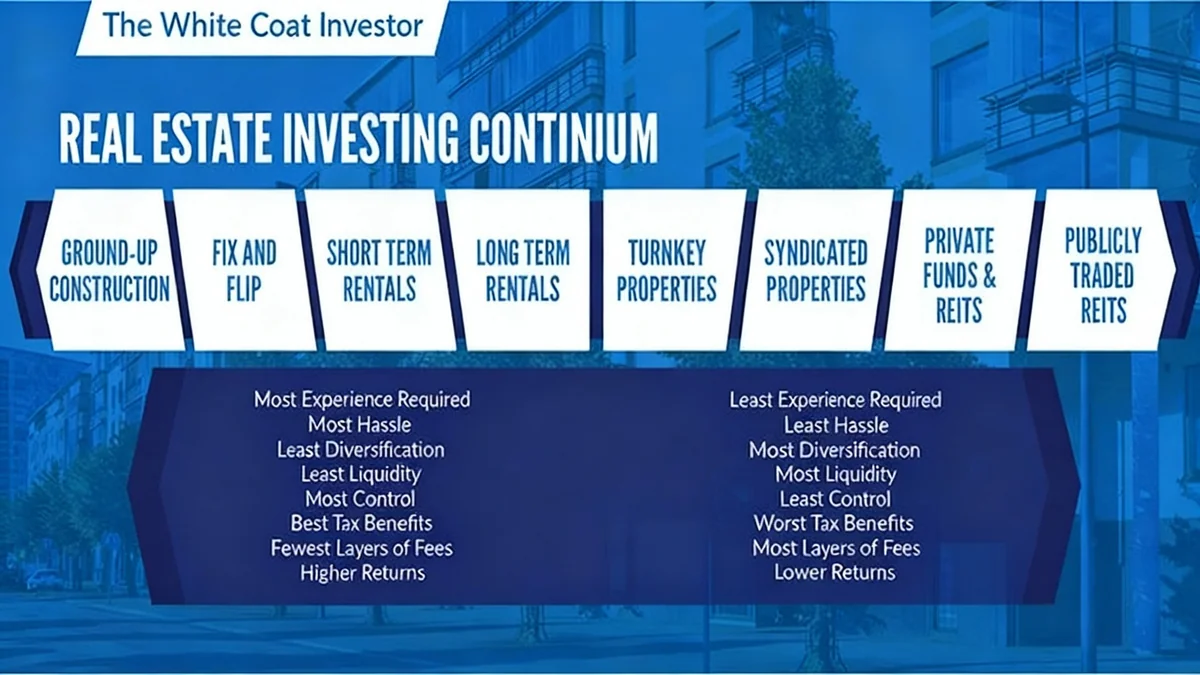Investing in private real estate offers distinct opportunities, but it also presents unique challenges compared to traditional stock market investments. While public markets have seen significant gains in recent years, private real estate has faced headwinds, including rising interest rates. This environment calls for a strategic and informed approach, particularly for high-income professionals considering this asset class.
Key Takeaways
- Private real estate is optional and requires significant effort.
- It is best suited for already wealthy, accredited investors.
- Diversification through funds is often safer than single syndications.
- Focus on moderate, secure returns rather than chasing high-risk ventures.
- Thorough due diligence and a long-term perspective are essential.
Understanding the Commitment to Private Real Estate
Private real estate investing is not a passive endeavor. It demands more work than managing a portfolio of index funds. High-income professionals do not need to invest in real estate to achieve financial success. Many multimillionaires have built wealth with simple, diversified, low-cost portfolios.
However, private real estate can be attractive due to its potential for high returns, low correlation with stocks and bonds, and unique tax benefits. These advantages come with additional expenses and administrative tasks, especially during acquisition and tax season. Investors must be prepared to accept less regulation, reduced liquidity, and potentially less diversification than public market alternatives. The benefits must outweigh these trade-offs.
Market Snapshot
- US stocks saw returns of 26% in 2023 and 24% in 2024.
- International stocks earned 6% in Q1 2025 and 12% in Q2 2025.
- Interest rates rose by 4% in 2022, impacting real estate.
- The Fed cut interest rates by 0.5% in late 2025.
Who Should Invest: Wealth and Accreditation
Private real estate is largely a game for established investors. It is not ideal for those just starting their investment journey or still managing student loan debt. Diversification and investment minimums play a crucial role. For example, if an investor aims for 20% of their portfolio in real estate, and funds require $100,000 minimums across three different managers for adequate diversification, a total portfolio of $1.5 million would be needed.
This suggests that private real estate is best used to grow wealth once it has already been accumulated, rather than as a primary tool to get rich. Attempting to enter this market too early with undiversified portfolios or inexperienced operators often leads to poor outcomes.
Defining an Accredited Investor
Most passive private real estate investments require investors to be accredited. This status allows these investments to operate with less regulatory oversight than publicly traded companies. The legal definition typically includes individuals earning at least $200,000 annually for the past two years or possessing investable assets of at least $1 million.
"Be able to evaluate the merits of an investment without the assistance of an advisor, accountant, or attorney AND Be able to lose your entire investment without it affecting your financial life in any significant way."
This expanded definition emphasizes the importance of financial literacy and resilience. Leveraged real estate properties can lose all value, and investors must be in a position where such a loss does not cause significant financial distress.
Navigating the Real Estate Spectrum
The real estate investment landscape offers many options. Matching your investment method to your personal interest and expertise level is vital. For instance, building an empire of short-term rentals can be a fast path to financial independence for some, particularly when combined with flexible work arrangements. However, this approach demands significant entrepreneurial drive and carries inherent risks, essentially becoming a second job.
Investors who prioritize liquidity and diversification, and are willing to forgo some control, tax benefits, or higher returns, may find themselves leaning towards funds or publicly traded REITs. Others may prefer more hands-on approaches. The key is to find the right fit, much like choosing a professional specialty.
Investment Methods
- Short-term rentals: High control, entrepreneurial effort, potential for high returns.
- Real estate funds: Diversified, less control, often lower minimums than individual syndications.
- Publicly traded REITs: High liquidity, market correlation, less control.
- Individual syndications: High minimums, property-specific risk, more direct control.
Strategic Investment Choices: Funds Over Single Syndications
Many novice investors jump into individual syndications as their first private real estate venture. A typical syndication requires a minimum investment of $50,000-$100,000, similar to a private fund. However, a fund often provides exposure to a dozen or more properties, offering far greater diversification than a single syndication.
For those new to private real estate, starting with a fund is generally a more prudent approach. It allows investors to gain experience with diversified exposure before considering the higher concentration of risk associated with individual properties. Making an individual syndication your fourth investment, rather than your first, can significantly reduce initial exposure to single-asset risk.
Avoiding High-Risk Ventures
The allure of projected 18% returns often draws investors away from stable index portfolios. However, such high projections typically come with a high level of risk. This can include market risk, development risk, the risk that value-add plans fail, high leverage, or variable interest rate risk. The challenges faced by some investors in 2025, due to variable interest rate debt taken on in 2021, serve as a stark reminder of these risks.
It is often wiser to pursue investments with a slightly lower risk profile for initial ventures. For example, equity investments with lower debt-to-value ratios or fixed-rate debt might yield 10% instead of 13%, but they offer greater principal security. Considering private real estate debt funds is another strategy, offering stable returns with less volatility, secured by actual property.
Example Debt Fund Returns
- 2017: 6.71%
- 2018: 9.13%
- 2019: 15.84% (boosted by public listing)
- 2020: 7.61%
- 2021: 7.67%
- 2022: 9.47%
- 2023: 9.10%
- 2024: 9.92%
Due Diligence and Diversification
Choosing an investment partner with a proven track record is crucial. Few private real estate companies have extensive histories. Investors should seek out firms that have been operating for a significant period. This reduces the risk of encountering incompetence or fraud, which often surface within a company's first few years.
Thorough due diligence is non-negotiable. While most investors may not conduct exhaustive background checks, reading the Private Placement Memorandum (PPM) is a minimum requirement. Pay close attention to sections on risk, leverage, fees, and liquidity. Searching online for the company and its officers, using terms like "fraud" or "scam," can also uncover critical information. Engaging with other investors and attending company webinars can provide further insights.
The Power of Diversification
Diversification protects against unknown and unforeseeable risks. For investors accustomed to diversified stock portfolios with thousands of holdings, a real estate portfolio with only a few properties is insufficient. Aiming for dozens of properties, even within funds, provides a more robust defense against individual property failures. This approach mitigates risk and enhances long-term stability.
The Long Game: Patience and Perspective
Once an investment in private real estate funds or syndications is made, control largely transfers to the managing entity for several years. Investors pay fees for this management, so the goal is to relax and allow the professionals to handle the day-to-day operations. While companies provide regular updates, constant monitoring is often unnecessary. Many in-depth updates are primarily opportunities to market new investments.
The focus should be on the initial due diligence before investing, rather than obsessing over every quarterly report after the fact. Reviewing past reports from a fund can offer insight into their communication style and operational transparency. Ultimately, private real estate investing requires a long-term perspective and the discipline to let the investment mature.
Syndications vs. Funds
- Syndications: Direct investment in a single property, higher property-specific risk, more due diligence required at the property level.
- Funds: Diversified across multiple properties, managed by a professional firm, generally lower risk per property.
For those interested in exploring private real estate, beginning with proper education and due diligence is paramount. Resources like specialized newsletters can offer valuable tips and alert investors to new opportunities, helping to build a well-informed and resilient real estate portfolio.





